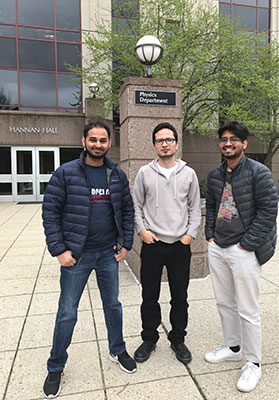
What strategic approach would you take if you wanted to increase voter turnout? Specifically, how would you encourage citizens in Washington, D.C., to show up to the polls and cast their ballots?
That was the problem presented to eight teams of Catholic University students at a hackathon on Saturday, March 30, sponsored by the School of Engineering’s Center for Service through Innovation. The title for this year’s event was “Data Science Insights to Improve D.C. Voter Turnout.”
The goal was to examine D.C. voter participation data, complemented with additional public data, to glean insights that could be turned into ways to boost the number of voters.

The winning team included three graduate students in physics: Niraj Bhattarai, Rishabh Uniyal, and Andres Vargas. Each of the three was awarded an Amazon Echo Plus (2nd Generation) for their work.
As a first step to proposing solutions, the international trio — Bhattarai hails from Nepal, Uniyal is from India, and Vargas is from Colombia — compared Ward 8, which has the city’s lowest turnout rate, with Ward 3, where it is the highest. In trying to account for the difference, the three scholars looked at economic status, literacy, education, median income of residents, and other factors.
They found several interesting correlations. For example, fewer than 16% of Ward 8 residents have bachelor’s degrees. Single individuals outnumber married people, and the median income is lower than in other wards.
The policy proposals ultimately suggested in a PowerPoint presentation by the winning trio include making Election Day a holiday, so people won’t have to choose between work and civic duty; offering free transport to and from the polls; providing tax deductions to voters who earn less than $40K per year; and enacting a law requiring employers to allow a few hours of paid leave to employees who present proof of having voted. They also suggested offering workshops on voting and registration to high school students, as well as public meetings to raise voting awareness among adults.
Several participants in the hackathon, including all three members of the winning team, are doing coursework in the new Data Analytics program. Their teacher, Erion Plaku, an associate professor in the Department of Electrical Engineering and Computer Science, was an organizer of the event.
“I like the opportunity to offer students real-world problems that are challenging, and where students can see an impact to the community that will last,” Plaku said.
“This was a great exercise,” said Uniyal. “I do data analysis on a regular basis, but the data analysis that we do in physics is different. I’m really interested in using data science to work on real-world problems. In physics, you don’t see the results immediately. But here, you can focus directly on a problem and propose solutions right away.”
Other teams offered various suggestions to increase voter turnout, such as opening more polling places and distributing literature on issues and candidates at bus stops.
“We saw people working with many different ideas based on the same data set, so that was quite interesting,” Vargas said. “It was an opportunity to see how different people approach a problem. One of the other teams proposed an app to increase awareness on the topic. It was a good experience, definitely.”
This was the second annual hackathon sponsored by the School of Engineering. Last year’s event, “Hacking Homelessness,” challenged students to use their data science and engineering skills to find ways to improve the lives of the homeless population.
“The hackathon is a great opportunity to expose students to service through innovation, and to help them build their leadership, teamwork, and communication skills,” said Hang Liu, an associate professor in the Department of Electrical Engineering and Computer Science, who helped to organize the event. Active alumnus Chris Danek, B.M.E. 1989, who is teaching part-time in the School of Engineering, was also an organizer.
In addition to Plaku, the panel of judges included Mari Hoefler, of MEDS Publishing, and Vimesh Patel, of World Wide Technology. Rocket Software and Booz Allen Hamilton were corporate sponsors. But the students were the stars.
“I am impressed by the diversity of approaches and the insights gained,” said Patel.
The policy proposals suggested by the winning team may not be enacted soon, or ever, but their insights will remain vital.
“Voting is essential for our future,” Bhattarai said. “I think elections are always important. They can have a huge impact in our lives.”